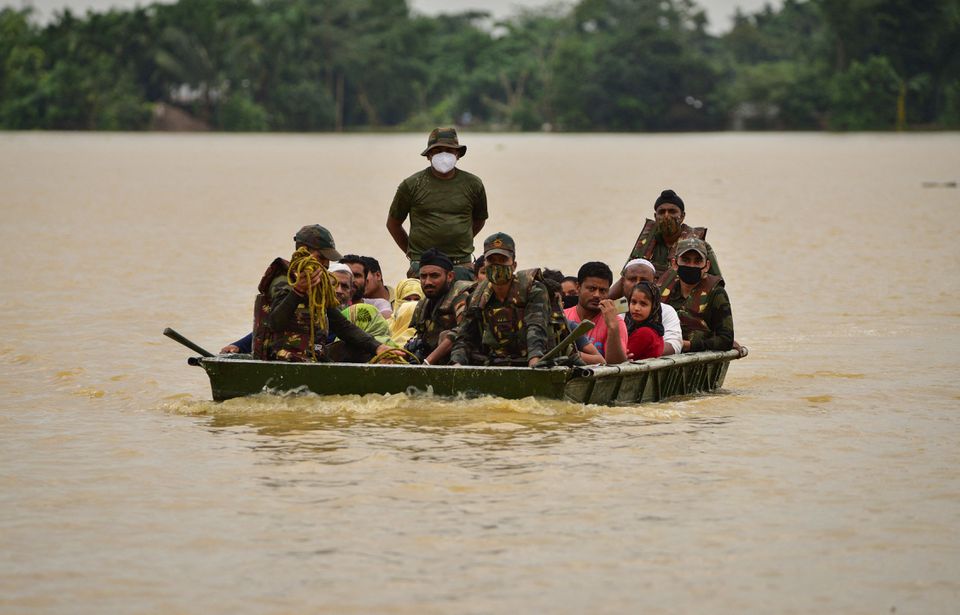Making Sense Of Climate Refugees, Int’l Law & Environmental Disasters
Mar 16, 2023 | Pratirodh Bureau
FILE PHOTO: Indian Army soldiers evacuate people from a flooded area to a safer place after heavy rains at a village in the Hojai district of Assam on June 18, 2022 (Reuters)
Researchers have tried for decades to find a relevant legal status for people forced to flee their homes as a result of floods, droughts and storms – calamities which climate change promises to make more severe and commonplace – as well as appropriate laws which might ensure their protection. But climate migrants are sometimes forgotten among the various flows of people seeking asylum.
To protect climate migrants who were forced to leave their country, some legal scholars have proposed amending the definition of refugee in the Refugee Convention of 1951 to consider environmental degradation a form of persecution. This would expand eligibility for asylum as a refugee under international law beyond the existing grounds of persecution by religion, race, nationality, membership of a particular social group or political opinions.
But the principle of non-refoulment, mentioned in the refugee convention, already prohibits a host country from returning asylum seekers to somewhere they would not be safe. This could be interpreted as guaranteeing access to an environment offering decent air and clean water, according to the European Environment Agency.
Despite this provision, international law is failing to protect climate migrants, which means that the scope of the refugee convention, however broad, must be widened.
Ioane Teitiota is a citizen of Kiribati, an island nation in the central Pacific Ocean. In 2015, he was denied asylum in New Zealand after floods forced him to flee with his family. He protested to the UN Human Rights Committee, which ruled that his situation did not constitute an imminent risk to life.
The legal right of the people of Kiribati to seek effective protection from saltwater intruding into farmland, coastal erosion and crop failures as a result of sea-level rise does not exist. New Zealand maintained that it could only reward refugee status to people if the state had failed to respect their fundamental human rights. The effects of climate change are systemic, the argument goes, rather than a personal persecution against Teitiota himself.
Nevertheless, the Human Rights Committee said that people who fled their country because of the effects of climate change can argue that their experiences amount to persecution and seek refugee status under the refugee convention. Vulnerable people could also claim that climate change threatens their right to life under the International Covenant of Civil and Political Rights. This includes situations where environmental disasters are interlaced with conflict, leading to water or air being contaminated by chemical weapons.
States might consider asylum claims resulting from climate disasters in the future. But until consensus is reached among scholars or jurists about the legal status of climate migrants, they will probably avoid introducing a broad interpretation of what comprises a climate migrant into international law.
Environmental disasters are unpredictable and the damage they cause can blight a territory for years, taking decades for people to properly recover. The people displaced may need to seek shelter in another country or region while the reconstruction is underway.
Climate change will cause an increasing number of disasters such as floods, droughts and wildfires. Legal solutions, especially in the case of climate change disasters, will be difficult to predict in advance. A firm understanding of what works where climate migrants are forced to settle will be invaluable.
States neighbouring vulnerable countries are more likely to be affected by inflows of climate migrants. By shouldering a disproportionate share of this responsibility, these countries will keep the impasse over the legal status of climate migrants alive on the international stage and have an outsize role in constructing an international consensus around their legal status.
As these countries attempt to acquire funding and build shelters to house migrants, they’ll also be dealing with a rising number of asylum claims. This will inevitably prompt research within the country to determine the most relevant legal status climate migrants need to guarantee their protection. This could attract international recognition as climate change and the entwined refugee crisis escalate.
There was a dramatic spike in 2015 in the number of migrants fleeing war and famine, especially in countries such as Iraq, Syria and Eritrea and migration policy remains a very sensitive and divisive topic of debate as a result.
Preparing the efficient protection of climate refugees is a challenge for the years to come. But in the meantime, people need help. The recent earthquake in Turkey and Syria caused several thousand deaths, but may have left millions without homes.
Only the creation of an efficient international framework of laws can guarantee refuge for people fleeing such environmental disasters in future. Building that outcome is likely to begin in the countries nearest to the suffering.
(This article is republished from The Conversation under a Creative Commons license. Read the original article here)
